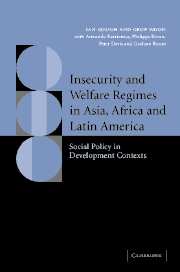 Insecurity and Welfare Regimes in Asia, Africa and Latin America
Insecurity and Welfare Regimes in Asia, Africa and Latin America Book contents
- Frontmatter
- Contents
- List of maps
- List of figures
- List of tables
- List of authors
- Acknowledgements
- List of abbreviations
- Glossary
- Introduction
- Part I Understanding insecurity and welfare regimes in the South: an analytical framework
- 1 Welfare regimes in development contexts : a global and regional analysis
- 2 Informal security regimes : the strength of relationships
- 3 Conceptualising in/security regimes
- Part II Regional regimes
- Part III Regimes in global context
- Conclusion : Rethinking social policy in development contexts
- References
- Index
1 - Welfare regimes in development contexts : a global and regional analysis
Published online by Cambridge University Press: 04 August 2010
- Frontmatter
- Contents
- List of maps
- List of figures
- List of tables
- List of authors
- Acknowledgements
- List of abbreviations
- Glossary
- Introduction
- Part I Understanding insecurity and welfare regimes in the South: an analytical framework
- 1 Welfare regimes in development contexts : a global and regional analysis
- 2 Informal security regimes : the strength of relationships
- 3 Conceptualising in/security regimes
- Part II Regional regimes
- Part III Regimes in global context
- Conclusion : Rethinking social policy in development contexts
- References
- Index
Summary
Introduction
The purpose of this chapter is to adapt the welfare regime paradigm in order to throw light on social policy and human development in the contemporary world, and to instigate an empirical analysis to map the pattern of regimes across the developing and transitional zones of the global system. It begins from and builds on my background in two fields of study: the political economy of social policy in the advanced capitalist world and the theorisation of human needs as a value base for understanding human flourishing across different cultural contexts. It is organised in eight parts followed by a conclusion.
The chapter begins with a brief discussion of human welfare as the basic goal and purported outcome of social policy and social development. Second, we discuss the emergence and development of social policy in the West – as both a policy discourse and practice, and as an intellectual area of study. Third, it introduces the ‘welfare state regime’ paradigm initially developed to understand the post-war welfare states of the West, reveals its underlying assumptions and shows that it is less applicable to the less-developed, the developing and the transitional worlds of the South and the East. Fourth, it constructs an alternative paradigm of ‘welfare regimes’ with some claim to universal applicability. Within this, fifth, it identifies informal security regimes and insecurity regimes: two meta-regime types to stand alongside the welfare state regime model.
- Type
- Chapter
- Information
- Insecurity and Welfare Regimes in Asia, Africa and Latin AmericaSocial Policy in Development Contexts, pp. 15 - 48Publisher: Cambridge University PressPrint publication year: 2004
- 60
- Cited by


